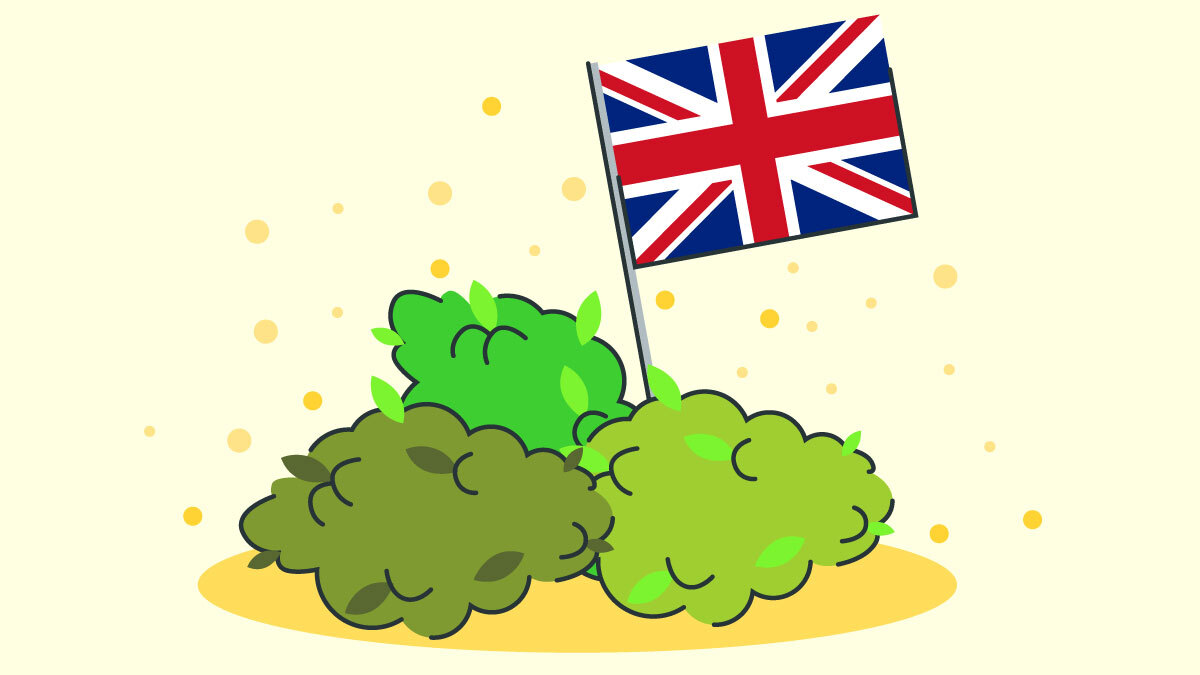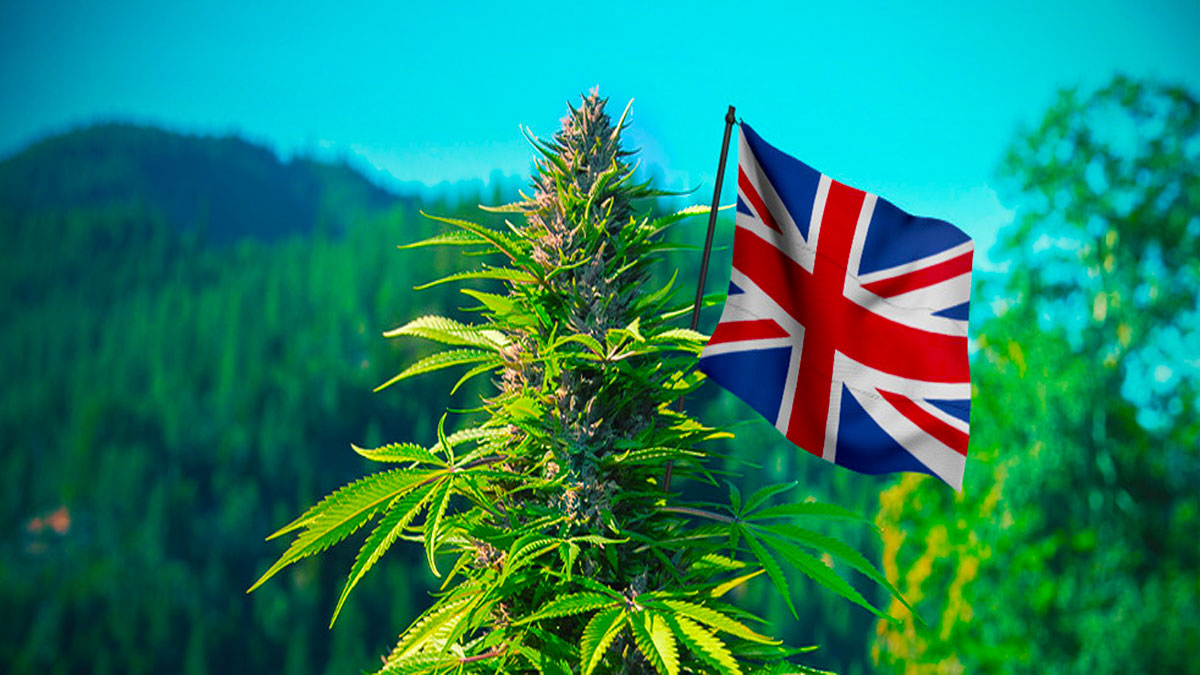United Kingdom Marijuana Laws: Is Weed Legal in The UK?

Whenever you get angry or discouraged by the slow pace of marijuana legalization in America, you might want to pause and consider the plight of our friends across the pond.
You might even want to pour out a pint to commiserate with them, since drinking alcohol is the only way that residents of the United Kingdom can legally get high.
In effect, British citizens are where many Americans were a couple of decades ago.
Weed is illegal according to U.K. laws, there’s a medical marijuana program that’s only available to a few patients, some localities say they won’t bother to prosecute users — and there’s little indication that the situation will change dramatically anytime soon.
Here’s a status report on weed in the U.K.
The History of Cannabis in the U.K.
Just so we’re all on the same page, the United Kingdom is made up of England, Scotland, Wales, and Northern Ireland. (Great Britain is a geographic description, not a political one; it doesn’t include Northern Ireland.) Each of those regions has limited self-rule, but they’re all governed by U.K. law.
Britain slowly began banning weed in its colonies in 1840, but it wasn’t until 1928 that cannabis use was legally prohibited in the United Kingdom.[1]
In 1971, the U.K. passed the Misuse of Drugs act, and classified cannabis as a “class B drug” along with opioids like codeine, stimulants like amphetamines, and sedatives like ketamine. “Class A” includes serious drugs like heroin, LSD, and meth, as well as prescription opioids like OxyContin.
Marijuana was briefly moved to “class C” in 2004, where it sat alongside prescription meds like Ambien, Xanax, and Tramadol. That eliminated the threat of arrest for possession of small amounts. However, political pressure forced officials to move weed back to class B in 2009, against the recommendation of the nation’s drug advisory council.
That matters. Even though the British government doesn’t put cannabis into the same legal category as heroin (where it remains in America), potential penalties for growing, using, or selling it can be quite severe.
U.K. Enforcement of Cannabis Offences
The punishment for being caught with weed in Britain can potentially be harsh. Residents charged with possession could be sentenced to as much as five years in prison and fined an “unlimited” amount of money. Cannabis production and dealing can land offenders in prison for as many as 14 years.[2]
There’s a loophole, though, because officials understand that they’re on the wrong side of public opinion. A poll of U.K. residents by the think tank Volteface found that 59% of respondents favored the legalization of marijuana for recreational use. Only 31% opposed it.
The result has been a more-lenient enforcement system somewhat similar to the one that emerged in most pre-legalization American states.
These days, individuals arrested for possession of an ounce or less for personal use in the U.K. are usually issued cannabis “warnings,” “disorder notices” or “cautions,” in increasing level of severity. They’re essentially similar to parking tickets.
Warnings don’t go on the offender’s permanent criminal record, and they are erased after one year as long as there hasn’t been another violation. Disorder notices carry a small fine and aren’t considered criminal offenses. Cautions are usually issued if there have been previous offenses, and they go on the person’s permanent criminal record.
So decriminalization of weed isn’t an official policy in the U.K., but that’s essentially what’s happened in practice.
According to the most recent figures, prosecutions for weed possession dropped 34% over two years. Cautions also fell by one-third, down to only about 6,500. And over eight years, warnings dropped by more than two-thirds, to only 33,514. (Those numbers just cover offenses in England and Wales.)[3]
There’s another issue to consider, though: medical marijuana. And U.K. patients are far behind those in the United States when it comes to access to weed.
Medical and Recreational Marijuana in the U.K.

The nation “legalized” medical marijuana in 2018, after public outrage at the plight of a 12-year old child with epilepsy.
Billy Caldwell suffered serious seizures, which had been initially and successfully treated with cannabis. However, U.K. authorities confiscated his weed and prevented further treatment — and Billy ended up in the hospital with life-threatening complications.
That led to the approval of a “medical marijuana law” which dealt with cases like Billy’s and that of another 6-year old epilepsy patient.[4]
However, not many patients qualify for weed under that U.K. law.
Only specialized doctors can prescribe “cannabis-derived” medications (only one currently exists, for the treatment of multiple sclerosis). They can only do that when there’s an “exceptional clinical need,” all standard treatment options have been exhausted, and there’s clear published evidence that cannabis can provide medical benefits for the specific illness.
Needless to say, that eliminates nearly all of the conditions for which medical marijuana may be prescribed in several American states. Chronic pain patients, for example, aren’t eligible for a medical card in Britain.
And approved patients have to pay for the herb; it’s not covered by the U.K.’s National Health Service. One recent report focused on the plight of an 11-year old who suffers as many as 300 epileptic seizures per day; her family had to pay £2,000 per month for her medication until a private donor stepped up to cover the cost.
It’s estimated that there are nearly 1.7 million patients in the U.K. currently using weed, and the vast majority have to obtain it on the black market.
Studies are currently underway in Britain to supposedly produce “clear published evidence” of cannabis’ usefulness for additional medical conditions. Few in the patient community, though, expect to see much change in the current situation.
Local Enforcement of U.K. Weed Laws
Some local British police forces are taking the matter into their own hands, essentially ignoring minor “violations” of U.K. cannabis laws.
Officials in cities and counties like Durham, Surrey, Derbyshire, and Dorset have said they won’t enforce laws prohibiting personal possession of weed unless the use is blatant or a citizen has filed a complaint. And London mayor Sadiq Khan says police in several of his city’s boroughs will stop prosecuting teens and young adults for a possession; that approach may be soon expanded city-wide.
The bottom line, though, is that U.K. weed users currently face a patchwork system of local officials choosing to enforce — or not enforce — national cannabis policies that are far behind the times.
Is Weed Legal in the UK: FAQ
Q: Does this mean that you don’t have to worry about carrying a small amount of weed in the U.K.?
A: That’s probably true, but it’s not a guarantee. The system of warnings and cautions is enforced in many jurisdictions, and in others, it’s only applied for those who are “blatant” about their weed use, but pot is still illegal. Just as in “non-legal” American states, it pays to be very, very careful.
Q: What happens if you’re stopped for drinking under the influence of weed?
A: That’s a different story. If police stop you and you test positive for marijuana, you’ll most likely face a caution at the very least. And if you were involved in an accident, you’ll quite possibly face criminal charges and perhaps jail time as well.
Q: Can U.K. citizens use weed in other Western European countries?
A: It’s a lot easier. Marijuana has been decriminalized in the Netherlands, Luxembourg, Italy, Spain, Portugal, and Norway, and largely decriminalized in Denmark, France, and Germany. If you buy some to bring home, though, exercise caution. Enforcement is often more stringent when you re-enter the U.K.
References
Nutt, D., Bazire, S., Phillips, L. D., & Schlag, A. K. (2020). So near yet so far: why won’t the UK prescribe medical cannabis?. BMJ Open, 10(9), e038687.[5]